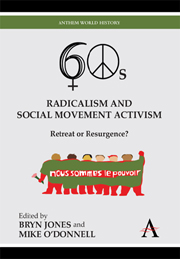Book contents
- Frontmatter
- Contents
- Introduction Sixties Radicalism: Creating Spaces and Leaving Legacies
- PART I Radical Movements Around the World
- 1 All Along the Watershed: Sixties Values as Defence of Community Lifeworlds in Britain 1968–2008
- 2 May's Tensions Today: France, Then and Now
- 3 The War Against the War: Violence and Anticolonialismm, in the Final Years of the Estado Novo
- 4 From Sartre to Stevedores: The Connections between the Paris Barricades and the Re-emergence of Black Trades Unions in South Africa
- 5 1968 – Was it Really a Year of Social Change in Pakistan?
- PART II Theoretical & Cultural Significance
- PART III Social Movement Legacies
- Conclusion
- Notes on Contributors
- Author Index
- Subject Index
3 - The War Against the War: Violence and Anticolonialismm, in the Final Years of the Estado Novo
from PART I - Radical Movements Around the World
Published online by Cambridge University Press: 05 March 2012
- Frontmatter
- Contents
- Introduction Sixties Radicalism: Creating Spaces and Leaving Legacies
- PART I Radical Movements Around the World
- 1 All Along the Watershed: Sixties Values as Defence of Community Lifeworlds in Britain 1968–2008
- 2 May's Tensions Today: France, Then and Now
- 3 The War Against the War: Violence and Anticolonialismm, in the Final Years of the Estado Novo
- 4 From Sartre to Stevedores: The Connections between the Paris Barricades and the Re-emergence of Black Trades Unions in South Africa
- 5 1968 – Was it Really a Year of Social Change in Pakistan?
- PART II Theoretical & Cultural Significance
- PART III Social Movement Legacies
- Conclusion
- Notes on Contributors
- Author Index
- Subject Index
Summary
If the slogan ‘make love, not war’ became a constantly evoked symbol of the kind of protest generated in the ‘long sixties’ (Jameson 1984; Marwick 1998, 16–20), the fact is that the attitudes and discourses that originated in this period have not always corresponded to this pacifist image, at times understood retrospectively as parodic, individualistic and carefree. In different times and places, at a gradually more intense pace, the new youth culture introduced profound changes in the fields of customs, taste and morality, and set in motion modes of daring and resistance which often evolved towards open confrontation with bourgeois social codes. The sixties experience, namely in its radical and politicized strand, promoted a new kind of fracturing and transgressive conflictuality, which, rather than rejecting violence, questioned its meaning and sought to redefine its application.
In Portugal, despite socio-cultural and political obstacles, some sectors, primarily originating in student settings, showed their openness to the influence of a certain ‘space 68’ (Frank 2000). This phenomenon intersected with the emergence of a new type of protest against the colonial war, in which philo- Maoist activism had a relevant role. Condemning the bellicose and nationalistic rhetoric of the Estado Novo [New State], these groups nevertheless saw violence as an indispensable means to achieve a desired classless society. This text seeks to analyse the question of violence in the new left radicalism, to contextualize the specificity of the Maoist experience throughout the sixties, and to characterize the practice and discourse of this multifaceted political field during the decline of the Portuguese dictatorship.
- Type
- Chapter
- Information
- Sixties Radicalism and Social Movement ActivismRetreat or Resurgence?, pp. 39 - 58Publisher: Anthem PressPrint publication year: 2010



